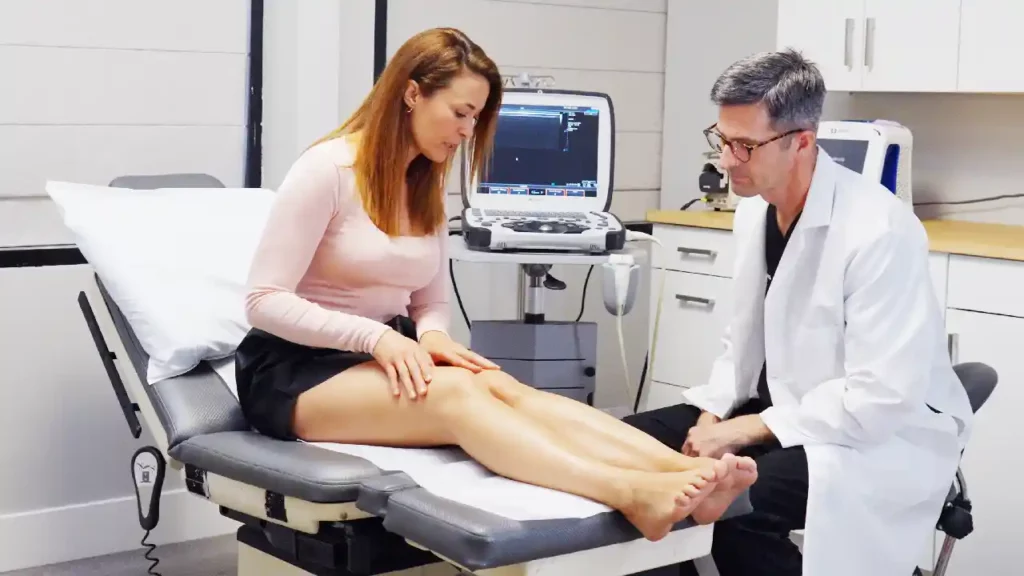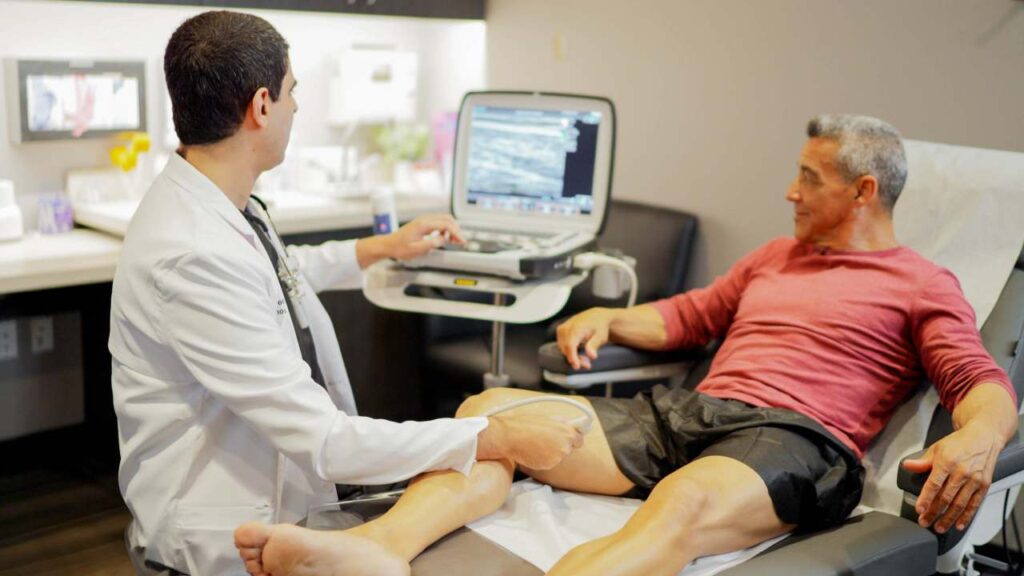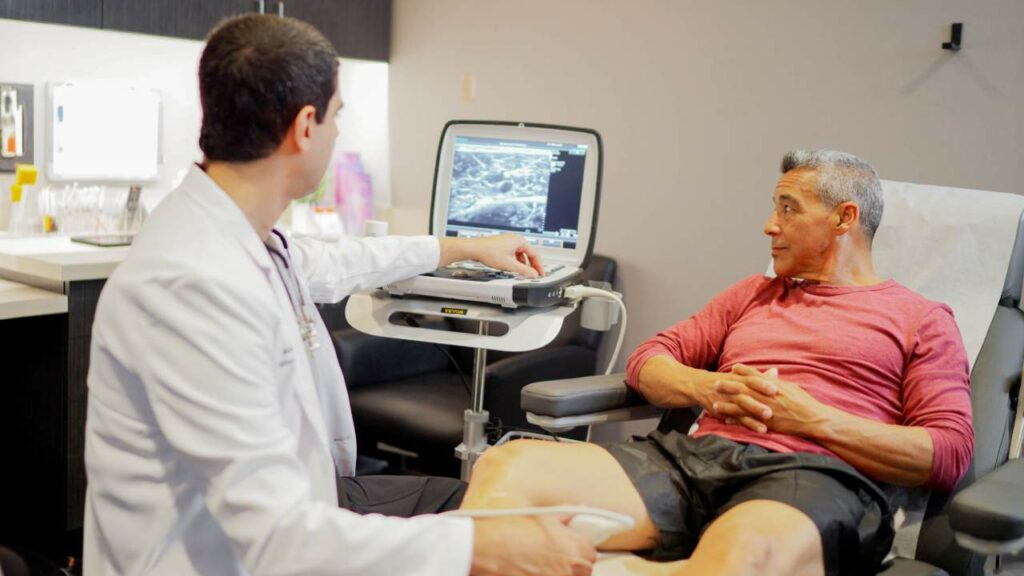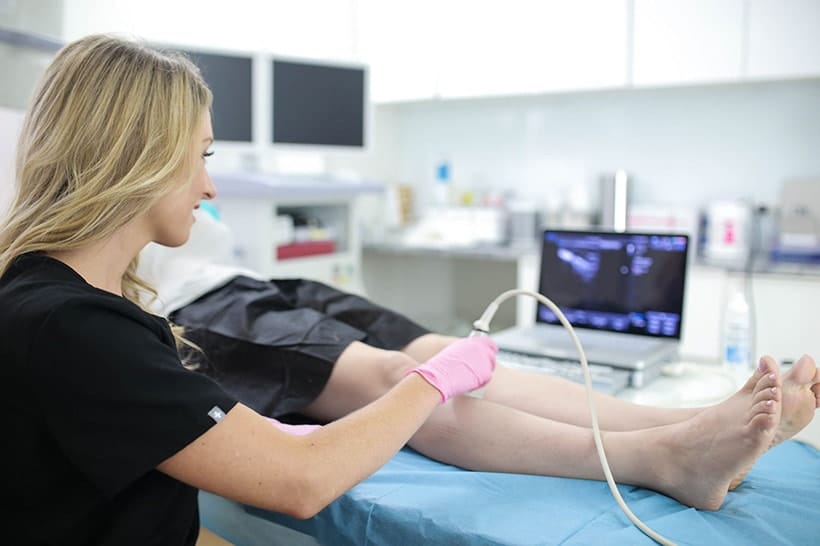How Do I Choose a Leg Swelling Doctor Near Me?
Leg swelling is a result of several illnesses, conditions, injuries, and medications. When selecting a leg swelling doctor, start by determining whether you have any of these emergency symptoms: chest pain, shortness of breath, abnormal heartbeat, widespread swelling in the body, or recent injury. If so, head to the emergency room. If not, look for signs of vein disease, like varicose veins, spider veins, leg heaviness, or cramping. Chronic Venous Insufficiency is one of the most common reasons to have swelling in your legs. Click HERE for a vein assessment at our renowned vein center in California. And read on to learn more about how to choose a leg swelling doctor near you.
Who Treats Leg Swelling After a Car Accident or Injury?
If you have leg swelling after a car accident, you might have an injury like a broken bone, torn ligament, or strained muscle. However, you might also have a venous, arterial, or cardiac injury that’s causing blood or fluid to accumulate. Head to the emergency room for leg swelling after a car accident. Other accidents like a fall or sports injury that prompt leg swelling also require urgent attention. Walking on an injured leg can worsen the damage, so if you have pain or leg swelling after an injury, stay off that leg and head straight to the doctor. The kind of doctor required for swelling after an accident depends on the type of damage sustained.
What Doctor Provides Varicose Veins Edema Treatment?
If you don’t have an injury or symptoms of a cardiac emergency, the most likely reason for persistent leg swelling is either your medication or your vein health. Acute leg swelling might resolve on its own. For instance, if you take a long plane flight or wear tight socks and shoes, swelling improves afterward. Pregnant women also experience acute leg swelling toward the end of their pregnancy. But persistent leg swelling that recurs, particularly if the patient isn’t taking medication that causes edema, is typically caused by venous insufficiency.
Varicose veins, spider veins and leg swelling are all caused by Chronic Venous Insufficiency, in addition to cramping, aching, fatigue, restlessness, and itchiness in the legs. This disease involves excess blood pressure in the veins, caused by broken valves that allow blood to collect and regress. As the disease progresses, patients can develop venous ulcerations (sometimes called an edema blister), venous stasis dermatitis, and profuse bleeding with the slightest abrasion on the leg.
This common condition is underdiagnosed, leaving many patients with leg swelling they shouldn’t have to endure. Our award-winning CA vein doctors treat varicose veins, edema, and venous insufficiency in our office in under 30 minutes. Surgery is rarely required to alleviate this condition. Visit us today for rapid relief!
Other Doctors to Consider: Can a UTI Cause Swelling in Feet?
A urinary tract infection is a bacterial infection that causes abdominal pain, a frequent need to urinate, and a change in the appearance of urine. It does not cause swelling in the feet initially. However, untreated, a UTI can progress to a kidney infection. When kidneys are inflamed, there is potential for edema. But leg swelling from kidneys is more likely to stem from kidney disease or failure, not a UTI. Some key differences between vein-related swelling and UTI swelling are that swelling caused by kidneys affects additional areas like the arms, and involves symptoms like fever, nausea, and urinary urgency that aren’t involved in vein disease.
Are Swollen, Leaking Legs from Congestive Heart Failure?
One reason to check for the emergency symptoms listed in the introduction is that leg swelling can indicate congestive heart failure. The heart and veins are both part of the circulatory system, but it’s possible to have vein damage that isn’t an emergency (small spider veins), while most heart problems require prompt attention. Congestive heart failure can involve the left, right, or both sides of the heart. When the left side is impaired, blood backs up into the lungs, causing shortness of breath. When the right side is impaired, blood backs up in the veins and capillaries, causing fluid to seep out, particularly in the legs.
Heart failure means your heart cannot pump blood efficiently enough to supply your body with adequate oxygen. Veins pump blood back to the heart after it delivers oxygen to the cells. Since you have thousands of miles of veins, our vein doctors can seal off failed veins and reroute blood into other veins to return it to the heart. However, you only have one heart, so seek urgent care for cardiac symptoms like weeping, swollen legs to determine whether your heart or your veins are the issue.
What Do Fluid in the Body & Symptoms of Edema Usually Mean?
If you have leg swelling without red-flag symptoms, don’t panic. A frequent cause of fluid in the body and symptoms like leg swelling is the common condition called Chronic Venous Insufficiency. This disease affects roughly 40% of adults, impacting more women than men, and it’s easy to treat in our state-of-the-art vein center in California. Our vein treatments are minimally invasive and completed in 15-30 minutes, so you can eliminate swollen legs in less time than your commute.
Choose a qualified doctor for medical advice, diagnosis, or treatment of leg swelling since certain life-threatening issues like blood clots and tumors can cause swelling. But when swelling is relegated to the lower limbs and accompanied by spider veins or varicose veins, it’s typically linked to venous insufficiency (particularly if swelling worsens after sitting or standing and improves when legs are elevated). Our vein doctors are exceptionally qualified to address every symptom and side effect of vein disease.
How to Treat Swelling: Do I Really Need a Doctor?
As mentioned, sometimes leg swelling is an emergency, sometimes it requires a doctor visit, and sometimes swollen feet and legs resolve on their own. If you have an accident, injury, or warning signs like chest pain or shortness of breath, head straight to the hospital. However, if your leg swelling stems from things like a plane flight or constrictive socks, it’s okay to see if it resolves overnight. When your leg swelling doesn’t relent, it’s time to see a doctor.
It’s important to note that pitting edema (swelling that indents when you press on it) is commonly caused by veins and kidneys, while swelling that doesn’t indent might stem from a lymphatic disease or a disease like lipedema. In these less prevalent conditions, weight gain is common and the swelling occurs in areas beyond the legs. If you have lumpy, fatty deposits that don’t indent when you press on them, ask your doctor about these conditions.
For most patients, the best doctor for leg swelling is a vein specialist. Vein disease causes discomfort primarily in the legs, like heaviness, cramping, itching, and restlessness, in addition to swollen legs and visibly damaged veins. If you have venous insufficiency, there are home treatments to reduce symptoms, like compression stockings, but only a vein doctor can resolve the disease. If it goes untreated, leg swelling will persist indefinitely and advanced symptoms are likely.
Visit our accredited medical center to treat your swollen legs and any additional frustrating symptoms of vein issues. Restoring efficiency to your circulatory system will improve how your legs look and also how you feel. Diagnosis and treatment are quick and easy at our innovative vein center.






